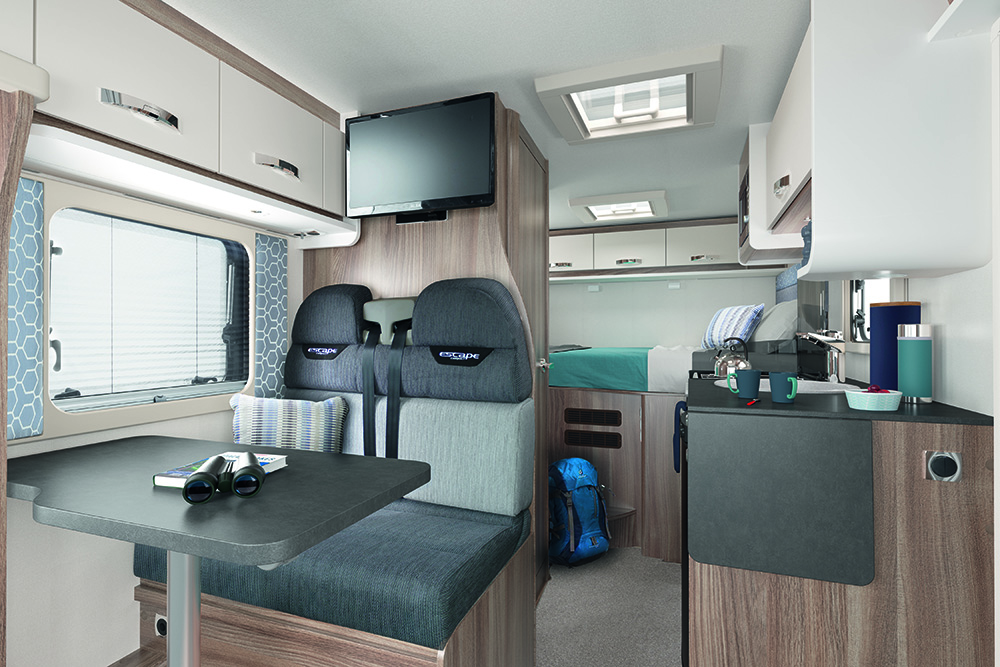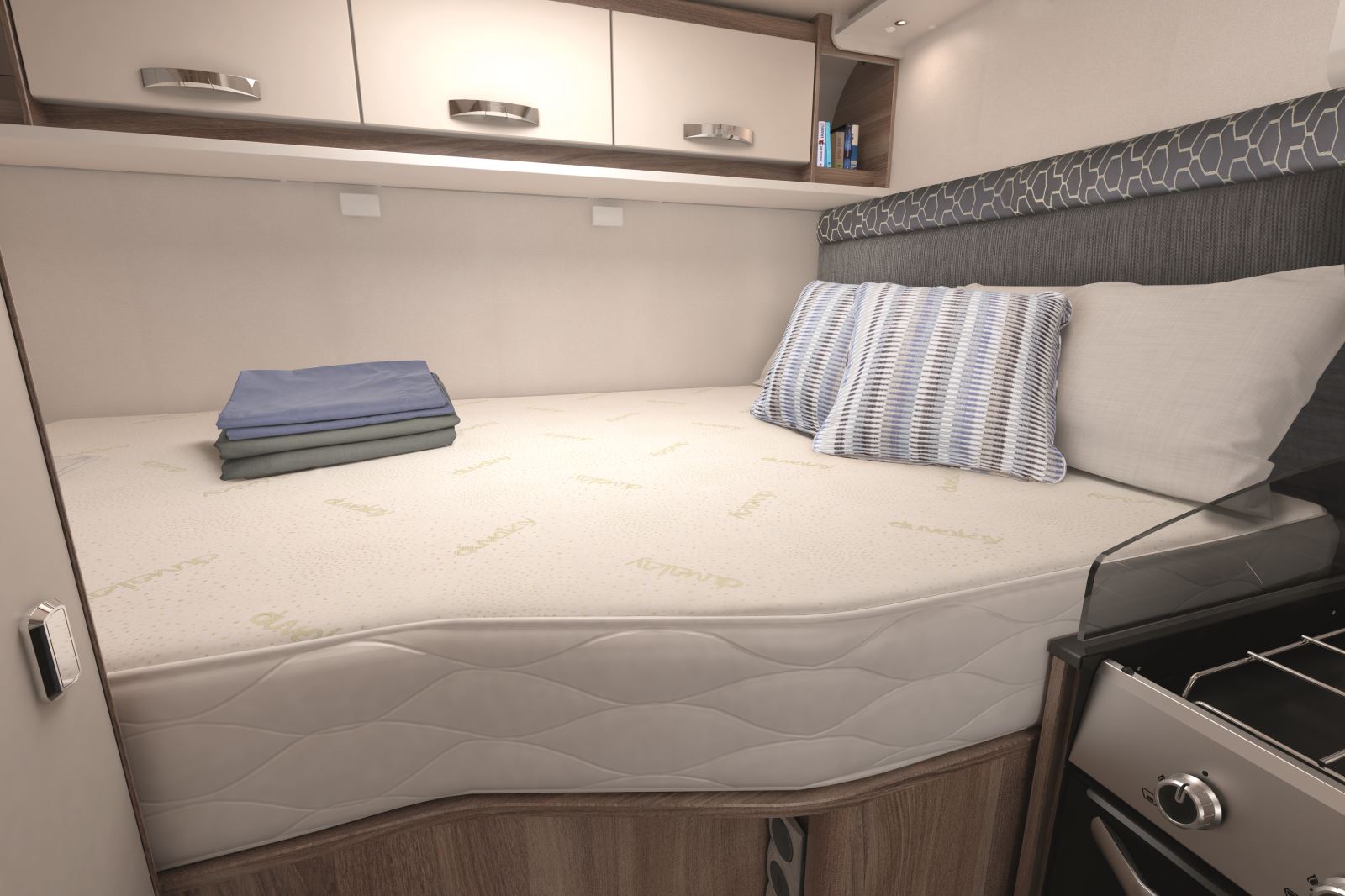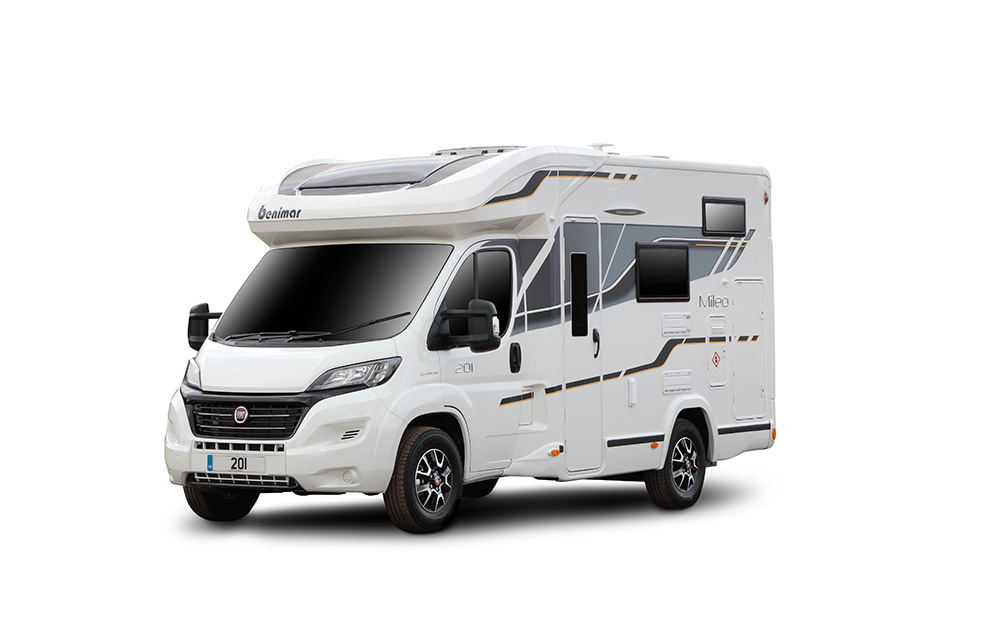Compact motorhome: Is it right for you?
One of the most basic considerations to make when thinking about buying a motorhome is just how big it needs to be. Click here to read our advice on choosing the right type and size of motorhome for you.
Bigger and better is not always the case when it comes to motorhomes — it very much depends on where you plan to go in your motorhome and how much space you really need inside, so try to be realistic and only go as big as you really need.

The longer the motorhome, the more space there is inside, but there are penalties to pay in the form of less manoeuvrability around busy towns, greater difficulty parking and possibly higher charges from ferry companies when journeying abroad. But that doesn’t just leave you with the campervan or panel van option… compact motorhomes are big business.
To make the distinction, a compact motorhome is generally one that is 6m or less in length. We’re not talking about campervans or panel van conversions but genuine coachbuilt motorhomes, and all the better insulation and facilities that they offer.
If you’re currently driving a larger coachbuilt motorhome and are looking to downsize, you’ll still be faced with a considerable choice of layouts and body styles in the compact motorhome market — from low-profiles to A-class motorhomes. Click here to read about the different motorhome layouts available.
The six pros of compact motorhomes
Opting for a compact motorhome has many advantages, some of which include:
1. Compact motorhomes are easier to drive
If you’re new to the motorhoming hobby and unsure about driving a huge vehicle, or if you’re looking to downsize your current motorhome, a compact motorhome could be the perfect choice. Not only do compact motorhomes often come in under the driving licence-friendly 3,500kg limit (click here to read more about motorhome driving licence restrictions), but they are also, obviously, a great deal easier to drive than a larger, heavier vehicle.
With no long overhang at the back of a sub-6m compact motorhome, negotiating a 90-degree bend at rush hour in a busy towns is a lot easier as you don’t have to swing out as wide to avoid cutting the corner off and catching any pedestrians.
In fact, you’ll probably find that driving a compact motorhome is easier in general, as you don’t have to repeatedly check the rear mirrors to see where the back end is. Reversing is also considerably easier as the rear wheels of the motorhome are nearer the back so it feels a lot like reversing an estate car.
2. Smaller motorhomes are often easier and cheaper to park
When parking a compact motorhome in a general car parking space, you can often reverse park and fit into just one parking spot towards the back of the car park (particularly if you find a space with a grass verge behind). As local councils expect you to pay for every parking space you use, it means you’ll only need to buy one ticket.
It’s also much easier to get into and drive around car parks than when driving a 7m long motorhome, which can prove to be impossible at busy times.
3. Cheaper ferry crossings for smaller motorhomes
Ferry companies will always ask how long your motorhome is, and anything over 6m may be subject to an additional cost. Smaller, sub-6m motorhomes often easily slot into the narrow lanes alongside cars and other smaller vehicles.
4. More payload on a compact motorhome
As there is less superstructure, a compact motorhome tends to weigh less than a much larger coachbuilt, which in turn means there’s more payload on a 3,500kg gross vehicle weight. More payload means you’ll have more flexibility to load up with the gear that you want, like a satellite dish, TV and full size oven. Click here to read more about motorhome weights and payloads.
5. Better fuel economy for smaller motorhomes
Another advantage of a smaller motorhome is better fuel economy. Compact motorhomes are generally low-profile (as opposed to overcabs) which boast better aerodynamics and are easier to get into thanks to lower suspension.
6. Better insulation than a panel van
If you were thinking about getting a panel van because you didn’t want to drive a large motorhome then a compact coachbuilt is a compelling alternative. Generally wider, you get a little more space, but the real advantage is that a coachbuilt motorhome will have much better wall and under-floor insulation compared to a panel van. Sliding doors on panel vans can also be more draughty and certainly let out a lot of heat compared to a smaller habitation door.
The cons of compact motorhomes
The disadvantages of compact motorhomes are mainly related to space and layout, so it’s down to the individual motorhome manufacturers to come with innovative ways to make the space work. Click here for our guide to motorhome layouts.
You’re highly unlikely to find fixed, longitudinal single beds in a compact motorhome as they take up too much room and eat into the rest of the motorhome’s layout. Instead you are likely to find a transverse double bed, which can be a huge disadvantage if you’re tall. You might also find that a transverse double isn’t suitable if one of you has to get up frequently in the middle of the night.

When a motorhome has a fixed bed, something else will have to make way and with European motorhomes this tends to be the lounge area, which ends up being a two-seater dinette with cab seats that swivel round to face it. However, manufacturers are coming up with novel ideas all the time.
One of the more popular layouts uses a drop-down bed over the lounge as this means that more space can be freed up everywhere else, leading to a generous kitchen area or washroom. The disadvantage of having to use a drop-down bed is that if one person is tired but the other isn’t, your lounge area will be compromised when the bed comes down.
Take a look at the selection of compact motorhomes currently for sale in our online Motorhomes for Sale section.
Now you have a better understanding of compact motorhomes — and the motorhome layouts that are available — check out our ultimate guide to buying a motorhome. If you’re looking to downsize and need to sell your current motorhome, read our ultimate guide to selling your motorhome.











Recent Updates
Campervan festivals: all you need to know
Get the lowdown on going to a festival with your campervan. We've got everything you need to know, from choosing the right festival to deciding what ...
Off-grid campervans: what you need to know
Ditching electric hook-up and wild camping in your campervan is a great, low-cost way to enjoy the outdoors ...
Where and how to sell my motorhome: the ultimate guide
Whatever your reason for selling, there are a number of steps to take to try to get the best price for your ...
Gas tanks or refillable cylinders: our guide to motorhome gas
From cooking dinner to the central heating, gas is an essential feature of motorhoming – here, we explore ...
Engine management lights: all you need to know
What is the engine management light? What does it mean, and what do I have to do? ...
Motorhome air suspension: all you need to know
Motorhomes are heavy and the additional weight of equipment and height of the bodywork can increase the loads ...
Motorhome WiFi: how to get better motorhome internet
Staying connected on the move is more and more essential, so relying on campsite WiFi isn't an option – here ...
A class of their own - our guide to A-class motorhomes
Thinking of trading up to an A-class, or even going straight to the top of the motorhome tree? We guide you ...
Explore overseas on a motorhome dream tour
Enjoy exotic travel in a campervan or motorhome by hiring, swapping with someone else or exporting your ...
Motorhome water systems: everything you need to know
On-board water is an important part of every motorhome – here’s everything you need to know ...
Other Articles
Campervanning in Europe: what you need to know
Whether you're planning a leisurely drive through the French countryside, navigating bustling city streets in Italy or winding your way around ...
Campervan security: all you need to know
With thefts on the increase, it’s important to know how to keep your campervan secure and prevent campervan ...
Campervan furniture: everything you need to know
Our campervan experts guide you through all the essentials for your campervan, including tables, chairs, ...
Campervan finance: how to fund your purchase
Here we look at the different types of campervan finance available, to help you decide what’s the best option ...
Britain’s best used motorhomes
Want a great motorhome without paying the premium for a new one? Here's a guide to the best you can get in ...
Which motorhome? Choosing the perfect motorhome for you
Choosing a motorhome or campervan is one of the biggest buying decisions you’ll ever make, so it's important ...
Campervan washroom essentials: stay fresh on the road
Our guide will take you through the campervan washroom essentials you'll need so you're well-prepared for ...
Dogs in campervans: all you need to know
Follow our advice and your dog will enjoy campervanning as much as you do ...
Electric campervans: all you need to know
Our guide will take you through everything you need to know about electric campervans and what the future ...
Motorhome electrics: a complete guide to your motorhome electrical set-up
Motorhome electrics can dramatically enhance the convenience and comfort of your vehicle – but they can be ...